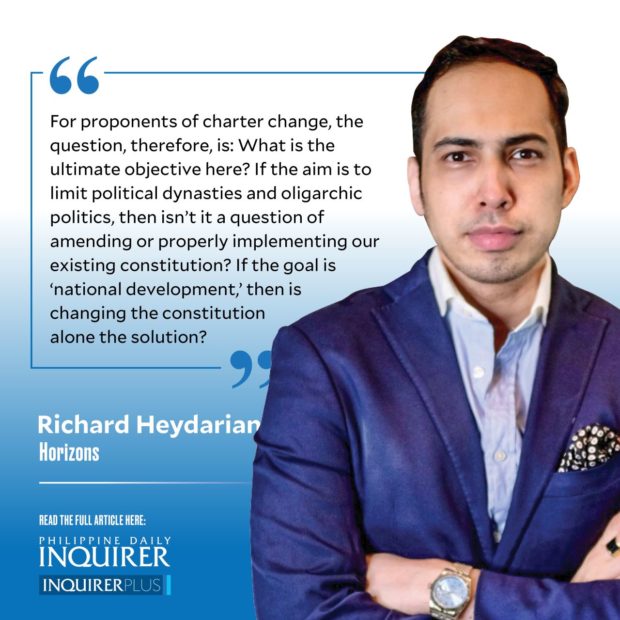Charter change: Much ado about nothing?
 Better to be despised for too anxious apprehensions, than ruined by too confident a security,” counseled Irish statesman Edmund Burke in his classic work “Reflections on the Revolution in France.” Far from an incorrigible conservative, Burke actually espoused reforms by rightly emphasizing how “a state without the means of some change, is without the means of its own conservation.”
Better to be despised for too anxious apprehensions, than ruined by too confident a security,” counseled Irish statesman Edmund Burke in his classic work “Reflections on the Revolution in France.” Far from an incorrigible conservative, Burke actually espoused reforms by rightly emphasizing how “a state without the means of some change, is without the means of its own conservation.”
For him, any reforms, however, should proceed from proper deliberation as well as be implemented with calibrated innovation in order to mitigate horrendous unintended consequences as in post-revolutionary France. There are no “shortcuts” and “free lunches” in politics. In many ways, Burke’s sobriety should guide our approach to the myriad of “charter change” proposals in the Philippines.
I recently received an invitation from the House of Representatives committee on constitutional amendments, led by Cagayan de Oro Rep. Rufus B. Rodriguez, to present my position paper on the charter change issue. Due to a conflict of schedule, however, I haven’t had the opportunity to personally attend the hearings per se, so let me, dear reader, provide a snippet of my take on the issue on three levels.
First of all, we need to be clear about the definition of terms as well as our core objectives. To be clear, constitutional change refers to the modification of the legal architecture governing a specific society. In contrast, a “political system” refers to the overall nature of the relationship between the rulers and the governed along a spectrum: On one extreme end lies the full-fledged dictatorship of North Korea, while on the other extreme end, one can find more participatory democracies such as Switzerland or Scandinavian nations.
Constitutions primarily shape the “form” of government, which is only a dimension of a broader political “system.” For proponents of charter change, the question, therefore, is: What is the ultimate objective here? If the aim is to limit political dynasties and oligarchic politics, then isn’t it a question of amending or properly implementing our existing constitution? If the goal is “national development,” then is changing the constitution alone the solution?
And this brings me to the second issue: cutting-edge research shows that national success is contingent on the establishment of inclusive institutions, which transcends the question of constitutional change alone. As leading economists such as Daron Acemoğlu (Massachusetts Institute of Technology) and Dani Rodrik (Harvard University) have argued, successful nations are those that have developed inclusive political and economic institutions as well as adopted optimal trade and industrial policies.
But the correlation between the “form” of government and constitutional architectures, on one hand, and the development of inclusive institutions, is, at best, tenuous. For instance, think of South Korea, Turkey, and France, three nations with similar presidential-parliamentary forms of government, yet extremely divergent trajectories in the past decade. Wearing Air Jordan shoes alone won’t necessarily make one an NBA player material. The same goes for copy-catting constitutions from other nations without addressing more fundamental institutional problems in any society. The third issue to keep in mind is the centrality of developing strong state institutions, in particular. Historically, in almost all late-developing nations—from Prussia and Imperial Japan in the late 19th century to the newly industrialized nations of Taiwan and South Korea in recent decades—strong state institutions were pivotal to sustained national development and, over time, democratic deepening.
Across Asia’s “success stories,” including nondemocratic China and Vietnam in recent years, a relatively capable, meritocratic, and autonomous bureaucracy oversaw a set of trade, industrial, and commercial policies, which ensured inclusive and sustainable growth. Instead of the oligarchs capturing the state, it was the state bureaucracy that tamed tycoons and nurtured national champions. Politicos come and go, but it’s the bureaucracy that runs day-to-day governance across administrations.
At the heart of the Philippines’ democratic-developmental deficit is the absence of a culture of “civil service excellence,” namely valuing and nurturing a strong state bureaucracy, which can protect and uphold public welfare against oligarchic interests and rapacious political dynasties. We need to guard against what legal scholars such as Nicholas Bagley have described as “procedure fetish,” namely an obsession with legal procedures at the expense of substantive institutional reforms. The real question, therefore, should be this: Is charter change the best and only way to truly create a strong and capable Philippine state and, by extension, a more inclusive and prosperous society?
rheydarian@inquirer.com.ph




















